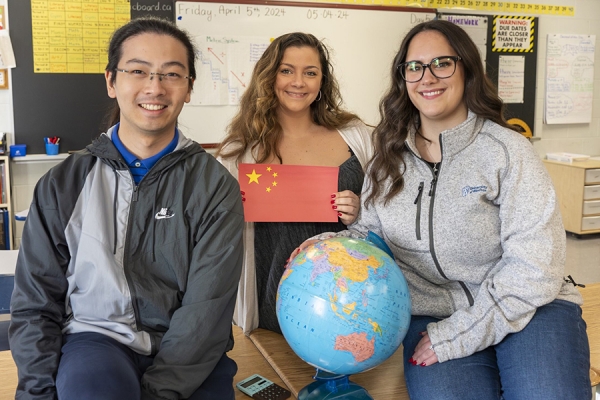 Yuyang Hua, Elizabeth Dalla Bona, and Sophia Boschin are immersed in Chinese pedagogies through the Reciprocal Learning Program.
Yuyang Hua, Elizabeth Dalla Bona, and Sophia Boschin are immersed in Chinese pedagogies through the Reciprocal Learning Program.
This summer, three aspiring educators will immerse themselves in cultural enrichment, new teaching methodologies, and exploration across China as part of an international learning program.
Elizabeth Dalla Bona, Yuyang Hua, and Sophia finished their final day of student teaching at Princess Elizabeth Public School, and about 48 hours later, they were jetting off.
The trio is making the journey through the Teacher Education Reciprocal Learning Program (RLP) where they will focus on research projects, visit schools, observe classes, and teach, all while exploring another corner of the world and gaining experiences with international engagement.
Their trip will span three months, with the teacher candidates returning on July 7.
Here’s what they had to say about the upcoming experience before taking off:
What will your day-to-day be like?
Dalla Bona: We’re going to be observing a lot of classrooms. Every Wednesday, we’ll be travelling to a different elementary school. We’ll also be waking up early to do kung fu at 6 a.m., teaching one class with the day ending around 7 p.m.
What is your research focus?
Dalla Bona: Yuyang and I are studying the cultural influence on classroom management in Eastern culture for grades seven, eight, and nine.
Boschin: I’m interested in sustainability education since my background is in environmental science. My thesis is comparing climate change education in Canada and China and trying to find a way it can be made more hopeful. The whole purpose of the RLP is to reciprocate information across cultures, since climate change is a global issue that affects everyone, I think it’s important to include everyone’s perspectives.
What do you hope to gain from this trip?
Boschin: Because of the nature of my research, I’m looking forward to seeing how China interacts with climate change education. I feel here it’s ignored, and people often have a negative, reactive approach. We have band-aid approaches like recycling and turning lights off, but we don’t have too much, in my opinion, that’s making a real difference.
Dalla Bona: I’m very interested in the idea of a global perspective. I’m a big traveller and always have been. I find the way the world operates in different areas to be so interesting. Not just the way people interact with content and ideas, but the way they interact with each other and their culture.
Hua: I have a Chinese background; I moved to Canada in the ninth grade. As a student I experienced both education systems, but now that I’m becoming a teacher I want to go back to China and see, from that perspective, how they run a classroom. I want to see how this can help me become a better teacher by incorporating both cultures.
Another thing is our research. Liz and I are focusing on the cultural influence on classroom management and my focus is on the moral education aspect. When I was a student in China, we had a moral education lesson that I did not see in Canada. So I want to learn more about how that works, and how we can do something similar here.
Can you explain what a moral education class would be like? What was your experience?
Hua: They have a specific class aimed at teaching moral values and how to be an ethical person. For example, why you shouldn’t bully, cheat, copy, etc. It’s situational, like if this happened, what should we do and how should we act?
How do you think having this experience will impact your future classroom?
Boschin: We are growing as a society and becoming increasingly globalized which can give the future generation some tough problems. As educators, we’re in the position to prepare them to be responsible citizens in that world with all the subjects we teach, but I don’t think we can do that without other perspectives.
Dalla Bona: I think the biggest takeaway I’ll incorporate into my pedagogy will be a sense of empathy. If you want to go to a country with a new culture, language and place you’re unfamiliar with, it will be uncomfortable for a while. That’s how many of our students feel every day, even when they are familiar with their surroundings. They go through so much and unless you experience that for yourself, you may not have the patience or empathy to be able to teach them, let alone know them.
Hua: For me, it’s more about how I can tie two streams together because I already have those two, but right now it’s parallel and not integrated because my education journey has been separated. But I think having this opportunity, I can tie everything together.
